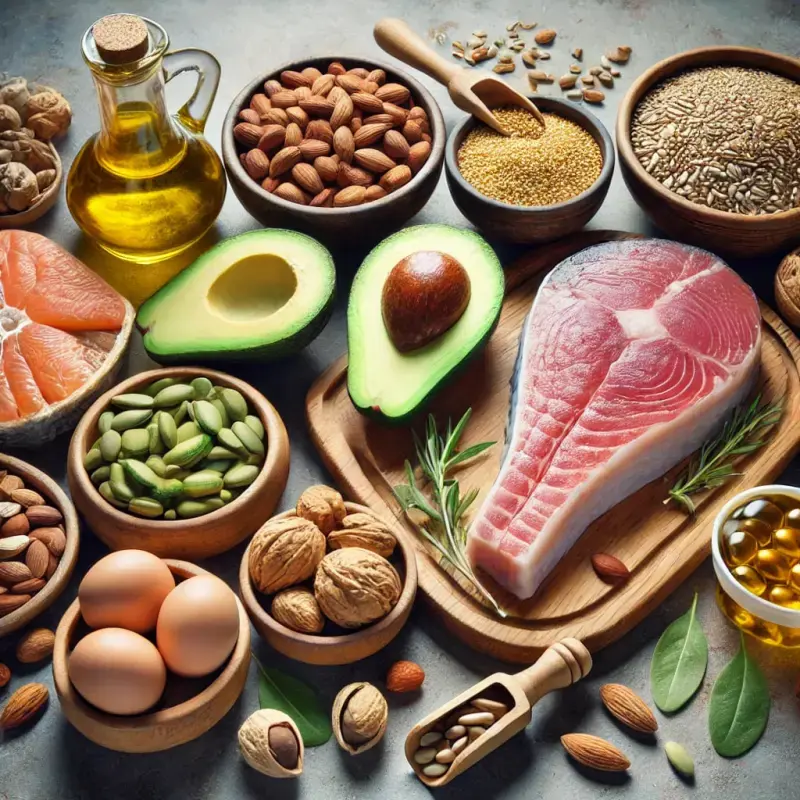Beneficial Fats for Joint and Cartilage Flexibility
Fats often get misunderstood, but certain types are not only helpful but also essential for maintaining the proper function of joints and cartilage. These special fats play a key role in supporting movement, reducing stiffness, and keeping our joints and cartilage working effectively over time.
In this article, we'll explore the types of fats that contribute to joint and cartilage flexibility, discuss how they work, and suggest the best ways to include them in your meals for better mobility.

The Role of Fats in Joint and Cartilage Function
Joints and cartilage are vital for fluid movement. Cartilage cushions joints, while the joints allow bones to move smoothly without rubbing against each other. With time, natural wear, physical strain, and poor dietary choices can reduce the flexibility of cartilage and lead to joint stiffness.
Certain fats, especially polyunsaturated and monounsaturated fats, are crucial for maintaining the elasticity of cartilage and improving the lubrication of joints. These fats help the body produce molecules that support cartilage flexibility and smooth joint movement.
Omega-3 Fatty Acids: Anti-Inflammatory Support
Omega-3 fatty acids are among the most important fats for joint and cartilage function. They have powerful anti-inflammatory properties, which help reduce discomfort and stiffness in the joints. Inflammation is one of the main factors that contribute to the breakdown of cartilage and joint issues.
By including omega-3s in your diet, you can help your body produce less of the compounds that cause inflammation, leading to more comfortable joint movement. Additionally, omega-3s help generate molecules that keep joints lubricated, making movement smoother and easier.
Key Sources of Omega-3s:
- Fatty Fish: Fish like salmon, mackerel, sardines, and trout are rich in EPA and DHA, which are omega-3 fatty acids that effectively support joint flexibility.
- Flaxseeds: These are packed with ALA, a plant-based form of omega-3 that benefits joints.
- Chia Seeds: Another great plant-based omega-3 source, chia seeds are easy to incorporate into meals.
- Walnuts: A convenient snack high in omega-3s that also contain antioxidants, which further support the integrity of joint tissues.
Monounsaturated Fats: Supporting Joint Fluidity
Monounsaturated fats are another essential group of fats that play a key role in supporting joint flexibility. These fats help maintain the fluidity of cell membranes, ensuring smoother movement in joints. They are also known to reduce inflammation levels, helping to prevent stiffness over time.
Key Sources of Monounsaturated Fats:
- Olive Oil: Extra virgin olive oil is rich in oleic acid, a type of monounsaturated fat that has been linked to better joint flexibility.
- Avocados: These fruits are a fantastic source of monounsaturated fats, known for their supportive effects on joint movement.
- Nuts and Seeds: Almonds, cashews, and pumpkin seeds are all excellent sources of monounsaturated fats.
- Peanut Butter: When opting for natural peanut butter (without added sugars or oils), you get a great source of joint-supporting fats.
Omega-6 Fatty Acids: A Balanced Approach
Omega-6 fatty acids are another group of polyunsaturated fats that contribute to joint and cartilage function. However, it’s essential to maintain a balanced ratio between omega-6 and omega-3 intake. A diet too high in omega-6 can lead to increased inflammation, but in the right amounts, these fats play a role in building and repairing cartilage.
By balancing your intake of omega-6 and omega-3 fats, you can help your joints function optimally.
Key Sources of Omega-6s:
- Safflower Oil: A good source of omega-6s that can be used in cooking or salad dressings.
- Sunflower Seeds: These seeds are rich in omega-6s and are a healthy addition to salads or snacks.
- Soybeans: Soy products like tofu and edamame are good sources of omega-6s.
Phospholipids: Supporting Smooth Joint Movement
Phospholipids are unique fats that help maintain joint fluidity and cartilage resilience. These fats form part of the synovial fluid that lubricates joints, allowing them to move freely. Phospholipids are also important for the maintenance of flexible cartilage.
Key Sources of Phospholipids:
- Egg Yolks: A rich source of phospholipids, egg yolks contribute to maintaining joint fluidity.
- Lecithin: Found in soy products, lecithin provides phospholipids that support joint lubrication.
How to Incorporate Beneficial Fats Into Your Diet
To take advantage of the benefits these fats provide for your joints and cartilage, it’s important to regularly include them in your meals. Here are some simple tips:
- Start Your Day Right: Add flaxseeds or chia seeds to your breakfast—whether in oatmeal, smoothies, or yogurt.
- Use Olive Oil in Cooking: Swap butter or margarine for extra virgin olive oil when cooking or making dressings for salads.
- Snack on Nuts: Keep a variety of nuts, such as walnuts and almonds, for an easy and nutritious snack that supports joint function.
- Include Fatty Fish: Try to eat fatty fish like salmon or sardines a couple of times per week to boost your omega-3 intake.
- Enjoy Avocados: Use avocado on toast, in salads, or blended into smoothies for a delicious source of monounsaturated fats.
By incorporating beneficial fats like omega-3s, monounsaturated fats, and phospholipids into your diet, you can support the flexibility and proper functioning of your joints and cartilage. These fats help reduce inflammation, promote joint lubrication, and contribute to overall mobility. With simple dietary changes, you can maintain the flexibility and resilience of your joints for smoother movement throughout life.
Articles
Opt-in for our notifications to stay updated with the latest and most captivating articles delivered to your email.